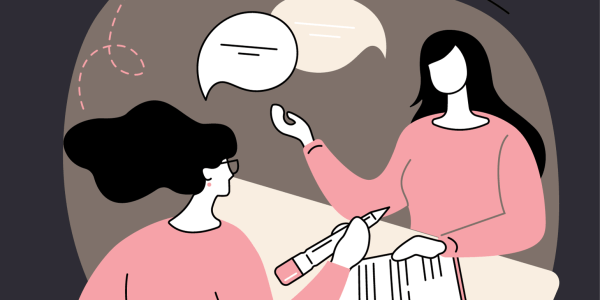“WHY AM I ALWAYS BEING RESEARCHED?” AN APPLICATION TO RPPs, PART 2

“If evidence matters, we must care how it gets made” (p. 6) is the opening line of the “Why am I always being researched?” guidebook by Chicago Beyond, an impact investor working to provide more equitable access and opportunity for Chicago youth. The authors elaborate: “If we do not address the power dynamic in the creation of research, at best, we are driving decision-making from partial truths. At worst, we are generating inaccurate information that ultimately does more harm than good in our communities.” (page 6)
At NNERPP, we first dove into the “Why am I always being researched?” guidebook at the 2020 Annual Forum –our yearly gathering of NNERPP members and friends in the research-practice partnership (RPP) space to come together and learn about all-things-RPP–, recognizing the relevance of the lessons identified in the guidebook for RPPs and wanting to learn from Chicago Beyond’s insights. In particular, the guidebook identifies seven inequities that get in the way of the truth when conducting research –these include access, information, validity, ownership, value, accountability, and authorship– and explores how these inequities can be opportunities for change. Table 1 below gives a brief description of the seven inequities.
At the 2020 Annual Forum, we invited a team from Chicago Beyond to lead us in an initial conversation about these seven inequities. Following that initial session at the Forum, we then invited NNERPP members to a Virtual Brown Bag where we further examined the inequities of “validity” and “access” and their application to RPPs. We captured some reflections from that Virtual Brown Bag in our NNERPP Extra article “Why am I Always Being Researched?” An Application to RPPs, Part 1.”
Centering equity in RPPs has certainly been top of mind for the NNERPP community in the last few years and we have explored many aspects of it as a community – for example, at our most recent Annual Forum this summer, nine sessions were dedicated to exploring the many ways RPPs might center equity in their efforts. Our intent with the second installment in this series is to now come back to the guidebook to continue our examination of the seven inequities. Having dived deeper into “validity” and “access” in our 2020 Virtual Brown Bag, we invited the NNERPP community to join us for a follow-up conversation last fall in a NNERPP workshop dedicated to exploring the inequity of “information.”
In this second installment of our multi-part series on applying Chicago Beyond’s insights around the seven inequities to RPPs, we share back a synthesis of the ideas and suggestions that surfaced during our October 2022 conversation. Our intention with these pieces is to capture and share the NNERPP community’s initial thinking on these topics; we hope to then iterate on these conversations and consider what additional supports might be useful for RPPs wishing to apply these lessons to their work.
Table 1. The Seven Inequities Identified by Chicago Beyond’s “Why am I always being researched?”
| ACCESS |
| “Could we be missing out on community wisdom because conversations about research are happening without community meaningfully present at the table?” (p. 7) |
| INFORMATION |
| “Can we effectively partner to get to the full truth if information about research options, methods, inputs, costs, benefits, and risks are not shared?” (p. 7) |
| VALIDITY |
| “Could we be accepting partial truths as the full picture, because we are not valuing community organizations and community members as valid experts?” (p. 7) |
| OWNERSHIP |
| “Are we getting incomplete answers by valuing research processes that take from, rather than build up, community ownership?” (p. 7) |
| VALUE |
| “What value is generated, for whom, and at what cost?” (p. 7) |
| ACCOUNTABILITY |
| “Are we holding funders and researchers accountable if research designs create harm or do not work? (p. 7) |
| AUTHORSHIP |
| “Whose voice is shaping the narrative and is the community fully represented?” (p. 7) |
REFLECTIONS ON INFORMATION
As noted in Table 1 above, the Chicago Beyond guidebook provides the following prompt for thinking about equity in information: “Can we effectively partner to get to the full truth if information about research options, methods, inputs, costs, benefits, and risks are not shared?” (p. 7)
During our conversation last fall, we invited the group to reflect on the following two questions, which are based on this prompt and rephrased in terms of RPPs:
- What kinds of informational biases exist between Rs and Ps (that is, those on the research-side and those on the practice-side of an RPP)?
- Even if you have the right people at the table (“access”) + value their expertise (“validity”), can you actually partner effectively if Rs typically hold [more power / less risk / more technical knowledge about the research process] relative to Ps?
Building on these, we also posed the following additional questions to invite further reflection and discussion.
- Where is informational power held?
- Can you really have “informed consent” or “equal partnership” if the knowledge re: research approaches may differ dramatically between R and P?
- What are differences in risk associated with research?
- What does it mean to have “full information”?
- Who knows what and who doesn’t know what? When does that have implications for partnership decisions?
- How might we equalize unequal informational knowledge? How much “equalization” is necessary?
- What features of the system reinforce these informational asymmetries?
We first invited the group to quietly ponder these prompts and share initial observations in writing on a Jamboard (a digital interactive whiteboard), then opened up the floor to conversation. In the ensuing discussion, the following four themes emerged.
(1) Transparency versus burden
The conversation started off with a more general wondering on information in RPPs: Does everyone have to know everything? NNERPP members observed that sharing information is time consuming and that within the partnership context, interactions and meetings generally have to be efficient and honor everyone’s limited time. This led the group to the observation that RPPs must strike a balance between transparency versus burden. Transparency gets at the difference between everyone having to know everything and everyone having the opportunity to know everything. If there are barriers that keep certain members of the partnership from knowing certain things in a systematic manner, then that is certainly problematic. But if all participants in the partnership have to be informed of all things all the time, whether it is relevant to their role or not, then this gets burdensome. If there is (i) transparency in how information is shared and how partnership decisions are made; (ii) the opportunity for everyone in the partnership to learn more; and (iii) trust within the partnership, then, the group suggested, partners can partner effectively. This led attendees to these related questions: When do informational asymmetries matter and when might they not? When are informational asymmetries harmful when it comes to equitable participation?
(2) Informational asymmetry in and of itself doesn’t have to be a problem
As the group was diving deeper into these questions of informational asymmetry, the conversation also turned to epistemological biases as we reflected on power imbalances in what counts as knowledge and data. Different NNERPP members in the group emphasized the real differences in the research and practice worlds when it comes to knowledge and seeing the world: Research-side participants (Rs) and practice-side participants (Ps) really do not see the world the same way, and their knowledge base really is not the same. Additionally, even among Rs and Ps, there isn’t necessarily agreement when it comes to epistemologies. One participant asked: We can look at the same thing but not see the same thing – so how can we then work together effectively and trustingly, especially when one epistemology might be valued higher than the other?
At this point in the conversation, another participant brought up a new thought, suggesting that the different epistemologies that RPP partners bring to the table can in fact be a strength, and, relatedly, informational asymmetry can be a strength in the RPP context; after all, this is what makes collaboration valuable. In fact, RPPs can be powerful precisely because they unite partners who all bring different knowledge to the table. As the participant noted, we must, however, be careful to be transparent about these asymmetries and we need mechanisms to elicit what each RPP participant knows –as well as what no one knows– in order to make this a strength rather than a source of inequity.
(3) RPPs challenge what is “typical”
We then turned to a new thought brought up by the group, as one participant challenged the second main question we had been considering: Even if you have the right people at the table + value their expertise, can you actually partner effectively if Rs typically hold [more power / less risk / more technical knowledge about the research process] relative to Ps? . As the participant pointed out, RPPs are already atypical, so maybe this question doesn’t quite apply as written: RPPs should generally question power relationships and should be –by definition– not biased toward technical knowledge. Of course, this doesn’t mean that RPPs do not struggle with power imbalances and with breaking down some of these assumptions. As another participant added, RPPs need to be intentional in challenging assumptions and shifting dynamics, including assumptions about what makes “good” research: Importantly, what is considered valid and rigorous research on the R-side is not necessarily what makes research useful and used on the P-side.
These thoughts prompted other participants to bring up additional questions, including: Do Rs actually hold more power in an RPP context? On the one hand, the R-side often gets the money for RPP research projects –another norm that we need to continue to challenge– so if power is money, the R-side holds a lot of power. On the other hand, the P-side has significant gatekeeping power: It typically has the data. It is often the R-side that needs to do a lot of work to even be invited to the table by the P-side, which has a lot of decision-making power when it comes to who they choose to partner with, what data they share, and for what kinds of projects. We rounded out these thoughts by stating that there are plenty of opportunities for informational inequity on both sides, which is why the commitment to collaborative work is so important to the potential of RPPs.
(4) Differences in risk might be more problematic than differences in information
Finally, our conversation turned to the political context in which the R- and P-sides operate, and the group shared thoughts on how differences in the political nature of the two sides and the associated differences in risk might be more problematic than differences in information – but might also contribute to informational asymmetries. On the practice side, for example, the political pressures around which findings get shared and how research is used often affect how and which decisions are made. The research-side instead often has their eye on tenure goals and institutional structures and systems that do not typically incentivize partnership work, worries that are more individual in nature and not subject to a public-facing microscope. These different realities can affect Rs and Ps show up in the partnership, which can then lead to tensions. One participant described the differences in risks associated with RPP work as follows: On the P-side, the risk is doing something that doesn’t yield practical knowledge, thus making the partnership research a waste of time, or doing something that exposes you; on the R-side, the risk is also doing research that is waste of time, but in the sense that it doesn’t yield publication. Both sides share the goal of producing partnership research that is new information and leading to practical impact. However, they face different risks as they pursue that goal. Each side’s perceptions of risk might ultimately be more challenging than asymmetries in information.
IN CONCLUSION
The 60-minute conversation was ultimately too short to explore the different aspects of inequities related to information in RPPs, but our participants nonetheless agreed that it was a rich discussion and a valuable opportunity to reflect on important questions, as well as raise new ones. We are looking forward to continuing to dive into the seven inequities raised by the Chicago Beyond guidebook and to seeing where these conversations take us. As we conclude this reflection piece, we leave you with some additional observations and questions that were raised during our Jamboard activity and that we didn’t get to during our conversation as a group. If these questions / observations or the reflections throughout this article leave you with thoughts you’d like to share, please feel free to reach out to us.
Additional observations and questions to ponder:
- To truly share power at the table, you really need to have a skilled facilitator/broker to help manage the relationships and the flow of info.
- What about the power differential within each partner’s organization? Whose voice gets heard? Whose voice is considered valid?
- The time scales Rs and Ps live on are so different. Even if trust and best intentions are there, it is a challenge to conduct research that meets the (external) needs of each.
- You may partner effectively if you regularly question and address power dynamics, assess and address risk, and understand technical knowledge as shared between R and P.
Nina Spitzley is Marketing Specialist of the National Network of Education Research-Practice Partnerships (NNERPP).
Suggested citation: Spitzley, N. (2023). “Why Am I Always Being Researched?” An Application to RPPs, Part 2. NNERPP Extra, 5(1), 28-33. https://doi.org/10.25613/JKC2-JS34









